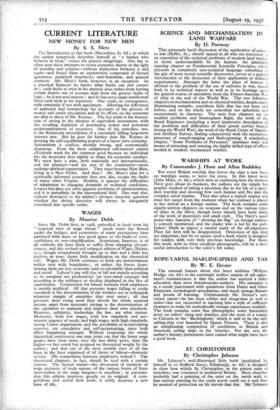SCIENCE AND MECHANISATION IN LAND WARFARE By D. Portway
This extremely lucid discussion_ of the application of science to war (Heller, 6s.) should appeal to all who are interested iu an exposition of the technical problems of modern land warfare in terms understandable by the layman. An 'admirable opening chapter on Fundamental Scientific PrinCiples, which presents in completely non-technical language something of the gist of more recent scientific discoveries, serves as a general introduction to the discussion of their application to military requirements. Amongst the latter the place of honour is allotted to the problem of the use of railways in war,. traced both in its technical aspects as well as in its bearings upon the general course of operations from the Franco-Austrian ;War of 1859 to the end of the World War. -The two 'following chapters on mechanisation and on chemical warfare, despite many illuminating remarks, contribute little that has not been said before, and on the whole are somewhat too aphoristic and unsystematic in character. The next four chapters are on weather problems and Stratosphere flight, the- work of the Royal Engineers. (including a most impressive. description of the problems and difficulties of their postal service branch during the World War), the work of the Royal Corps of Signals, and Artillery Survey, dealing exhaustively with the mysterious processes of sound-ranging and flash-spotting. A concluding chapter, "Some Problems of Personnel," examines ways and means of attracting and training the highly skilled type of officer needed in modern mechanised warfare.






































 Previous page
Previous page